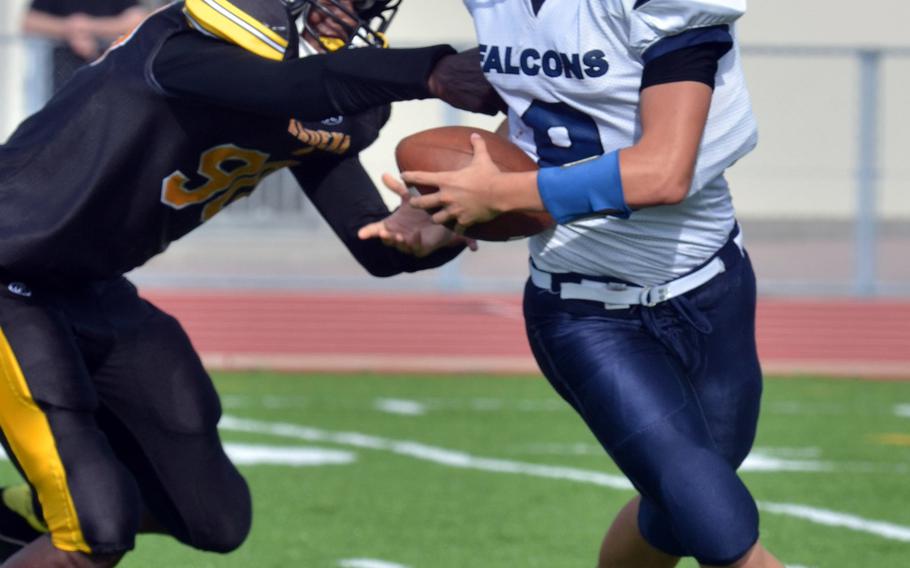
Seoul American quarterback Max Weekle, shown trying to evade Kadena defender Boysie Gordon, says he and his teammates wanted to continue playing Saturday's game, halted with 69 seconds left in the third quarter when the Falcons were deemed to have too few players to continue. It's a "Seoul tradition," he said, for the team to finish what it starts "regardless of the outcome," but he says he also understands that player safety comes first. (Dave Ornauer/Stars and Stripes )
TORII STATION, Okinawa – Max Weekley couldn’t have felt more disheartened.
Sixty-nine seconds remained in the third quarter. His Seoul American football team not only trailed host Kadena 40-0, but another Falcon player was down on the field with an injury – the fifth during the game.
They were down to 14 uninjured bodies (another was ejected). DODDS Pacific athletics coordinator Don Hobbs conferred with both coaches and decided the game should be terminated due to the health and safety of the teams.
“All the hard work we put in for that week,” said Weekley, the team’s senior quarterback. “I felt like that game was not an accurate representation of our team. I wanted to continue. It’s a Seoul tradition to finish what we started, regardless of the outcome. The safety of our players does come first, however.”
On the other sideline, senior kicker Stephen Black of a Kadena team that lost three players was told he might have to play defensive back if they lost any more.
“We all wanted to still play,” Black said. “We wanted to finish the game, but we understood about the injuries. We were losing our men, too. So, why risk more injuries?”
Saturday’s outcome, believed to be the first time a Far East Division I game got called off due to injuries, raises a question of balance between holding down costs and player health and safety.
Starting with the 2012 season, rosters of teams traveling and hosting D-I inter-district games were trimmed to 20 players and two coaches, from 25 and three, due to budget constraints. DODDS won’t release financial details on how much it costs teams to travel. But seats purchased in advance as DODDS does often cost about $300 each.
“There’s quite a difference between 20 and 25 in football,” said Tim Pujol, Yokota’s football coach and athletics director. With 25, “you have a better chance of putting together a roster with depth at every position.”
With so few players, coaches are forced to have them play multiple positions, to be ready to go in case others get hurt, he added. “You get down to 14, you end up putting 11 on the field and making an offensive line of running backs,” Pujol said.
It’s an issue that Hobbs and DODDS officials are “going to be addressing,” he said, adding that if there is any change, it will likely not happen this season.
Whether an increase in player numbers may have helped Seoul American and Kadena on Saturday is a matter of speculation. But Falcons coach Jim Davis said “the dynamic changed” once three of his players went down.
“We were playing aggressively, playing hard, you’re down to 17 with that heat, I saw it turn the corner,” Davis said. “It was taking a toll on their kids. (Kadena wasn’t) too far away from being in the same boat we were. “What would happen if another couple (of his) kids fall out?” “You spend all this money, get kids there, they want to play and the people paying also want to see us play. (But) where is the line between player safety, fiscal responsibility and being a competitor?”
Kadena coach Sergio Mendoza declined to comment for this story.
The situation is different when one team isn’t flying. When Kadena plays Kubasaki on Friday, 28 players are expected to suit up on each side. Teams in Korea and Japan are allowed to travel with as many players as they can fit in a bus.
So coaches can breathe a bit easier when air travel isn’t involved.
Nile C. Kinnick coach Dan Joley said playing with a roster of 20 “is not easy at all. It forces you to pick your top 20 at the beginning of the year, you spend a lot of time with that 20 and coach at all angles,” Joley said.
While it can be “frustrating” to be limited in bodies, “everybody faces the same difficulty. I understand the financial side. I get it. Everybody’s facing the same difficulty.”
But Pujol believes it could be safer if teams could field a few more players.
As the season progresses and players round into better shape, the chances of something like this happening again would likely diminish, Pujol said. “Coming out of the gate in September is the time when you’re most at risk of having what happened to Seoul happen.”